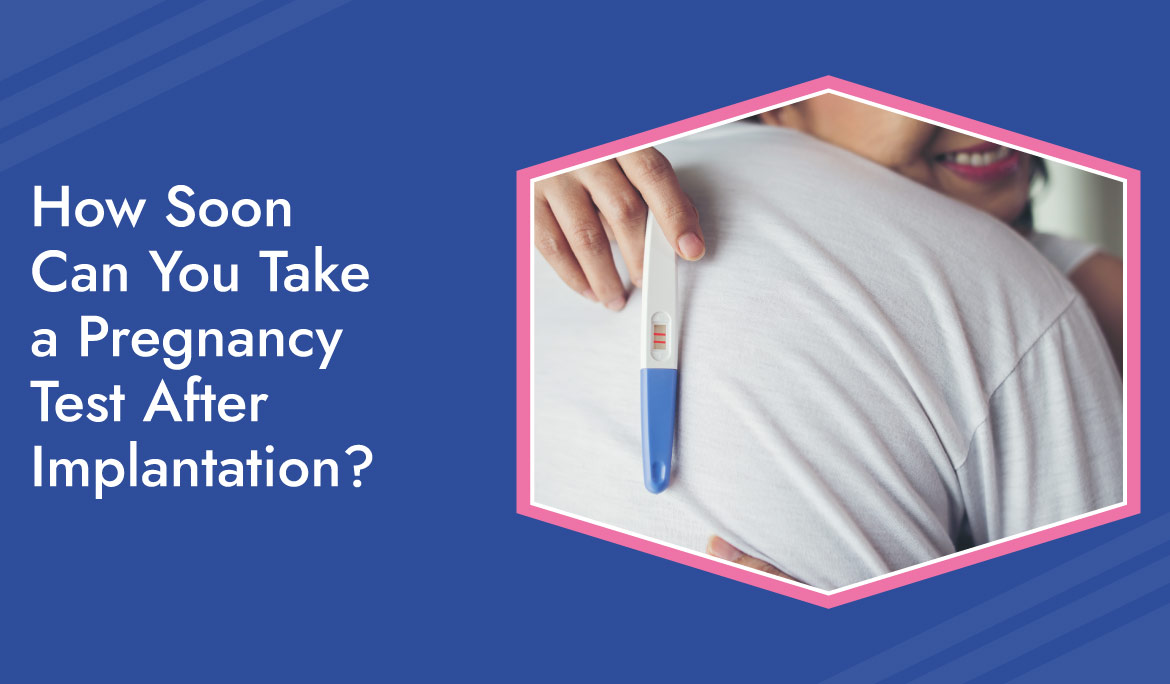That tiny pink line can feel like the biggest moment of truth. But how long does one need to wait after implantation for a pregnancy test? Timing matters the most when it comes to early pregnancy detection, and testing too soon can leave you having more questions without answers. In this blog, we will talk about how soon you can rake a pregnancy test after implantation, why you should wait and how to cope with a false negative. Let’s clear up the confusion!
Take control of your fertility journey. Consult our expert today!
A] What Happens During Implantation?
A successful pregnancy begins with implantation. This is when a fertilised egg attaches to the uterine wall, usually occurring about 6 to 10 days after ovulation. Once implantation occurs, the body produces Human Chorionic Gonadotropin (hCG) hormone, which is crucial for keeping a pregnancy going and is what pregnancy tests look for.
The timeline of implantation differs from one person to another. For many people, it happens at least a week to ten days after ovulation. However, many have it earlier or later. This difference influences when to test for pregnancy after implantation, as the body needs time to create detectable hCG levels.
Many ask if one can know about the implantation process through physical signs. Here are some signs that some may notice:
- Light spotting or implantation bleeding: This is usually pink or brown.
- Mild cramping, which is like menstrual cramps.
- Slight increase in basal body temperature.
After implantation bleeding, you may be curious about when to take a pregnancy test. Wait a few days before testing. This allows hCG levels to increase enough for detection.
B] Why Wait After Implantation Before Taking a Pregnancy Test?
The pregnancy test accuracy depends on a hormone called human chorionic gonadotropin, or hCG. This hormone is what the test measures. After implantation, hCG production begins. However, detecting the increase in hCG levels can take several days.
Timing is crucial for an accurate result. hCG levels rise after 6 to 12 days after implantation. Testing too soon may lead to false negatives because the hormone might not be at detectable levels. Waiting a few days after implantation can make a big difference in getting a correct result.
Also, remember that pregnancy tests have different sensitivities. Some tests can detect lower levels of hCG, but even the most sensitive ones may miss the hormone if used too early. Knowing your body’s cycle and picking the right test can help you determine the best time when to take a pregnancy test after implantation.
C] When Can You Take a Pregnancy Test After Implantation?
Timing is everything when it comes to taking a pregnancy test. It would be best performed 10-14 days after implantation or the first day of a missed period for accurate results. Testing too early increases one’s chances of having a false negative because the hCG levels in your urine are still too low to detect. Below are some of the factors that help you decide how long you can take a pregnancy test after implantation bleeding to avoid misleading results:
- Timing of ovulation: Knowing when you ovulated helps predict when implantation likely occurred.
- Cycle length: People with shorter, longer, or irregular cycles may need to adjust testing timelines.
- Sensitivity of the pregnancy test: Some tests would count a low level of hCG in the body for an earlier result.
- Implantation timing: Since implantation can vary from person to person, so can hCG production.
- hCG production rates: Some bodies produce hCG more gradually, delaying detectable levels.
D] Types of Pregnancy Tests and Their Sensitivity
There are mainly two types of pregnancy tests:
- Urine Pregnancy Test
This is usually a home-based test that detects hCG levels. You should wait for a minimum of ten days after implantation to take a pregnancy test. If the test is negative, you can attempt the test again after a few days to verify the conception. To confirm positive results, visit a doctor for a blood test.
- Blood Pregnancy Test
Conducted by health professionals, blood tests can detect hCG much sooner than urine tests and are more precise. They are especially sought after by patients on assisted reproductive technologies such as the IVF process, where timing is crucial.
If you’re unsure which test is right for you, consulting a fertility specialist in Mumbai like Dr. Hrishikesh Pai can offer valuable guidance. He provides expert fertility care, helping individuals make informed decisions during the early stages of pregnancy detection
E] What If You Get a False Negative?
If you suspect a false negative, don’t panic; it is much more common than you can think of, especially if you test too soon after implantation. Around 33% of women faced false negatives when they tested less than 9 days after their general menses calendar. A negative result doesn’t indicate that you’re not pregnant; it means that hCG levels haven’t risen enough to be detected. You can avoid confusion and get clear answers by taking the right follow-up steps. Here’s what you can do:
- Wait A Few Days And Test Again: Your hCG hormones tend to double every 48 to 72 hours, so if you can wait longer before retesting, that should help a lot. The first urine of the morning can help determine accurate results as it tends to have a higher concentration of hCG.
- Use A More Sensitive Pregnancy Test: Some pregnancy tests are sensitive to lower levels of hCG, and they can offer earlier or more reliable results; therefore, check on the packing for information on sensitivity levels and choose ones labelled for early detection.
- Consult A Doctor: A physician should be contacted for further evaluation if the menses is still absent, or irregular or if the individual is still getting mixed results. The doctor might recommend a blood test because it is more sensitive and can measure even minimal levels of hCG.
For individuals undergoing fertility treatments or navigating complex conception journeys, expert guidance can be invaluable. A fertility specialist like Dr. Hrishikesh Pai offers tailored advice and advanced fertility solutions, including IVF Treatment in Mumbai, helping you make informed decisions at every step.
Ready to take the next step in your fertility journey? Contact us today to schedule a consultation and explore the options best suited for you.
Take control of your fertility journey. Consult our expert today!

Dr. Hrishikesh Pai
Dr. Hrishikesh Pai is one of India's leading fertility specialists, with over 40 years of expertise in reproductive medicine and the Founder of Bloom IVF Group. He plays an important role in advancements in fertility care, establishing 11 world-class IVF centres across the country. Dr. Pai received numerous awards and is an Honorary Professor at D.Y. Patil University, Navi Mumbai. He is well known for his compassionate approach and continues transforming lives by fulfilling people's dreams of becoming parents.













